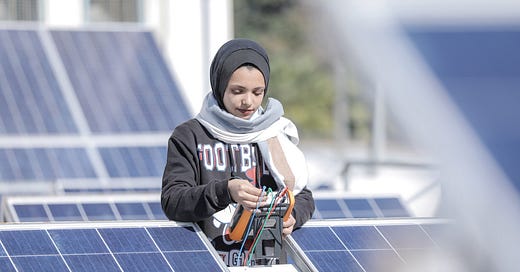We're back! Underrated EU climate policies and impactful charities
We've re-started the Effective Environmentalism newsletter and are growing a community of people and organisations committed to tackling environmental issues as effectively as possible.
Welcome to the first issue of the revitalised Effective Environmentalism newsletter, where we delve into important, tractable, and neglected solutions to climate change and other environmental challenges. Our goal is to foster a community of individuals and organisations committed to tackling climate change and other environmental issues as effectively as possible.
As we build Effective Environmentalism, you can look forward to receiving our monthly newsletter packed with information about effective environmental action.
You’ve received this newsletter because you’ve subscribed to the previous editions of the Effective Environmentalism newsletter a few years back. Not interested anymore? You can unsubscribe using the link at the bottom of this email. (But we hope you stay!)
🖋 We’d love to hear from you!
As we grow the Effective Environmentalism community, we’d love to hear from you! What type of content do you find interesting, and what should an Effective Environmentalism organisation focus on? Please fill in our survey, which only takes three minutes.
🇪🇺 Strategic prioritization for EU climate policy in 2024–2029
Which policies could the EU adopt to best accelerate global climate change mitigation? With the European elections coming up in early June, it’s worth thinking what actions the next mandate can take to reduce global emissions.
Non-profit consultancy Future Matters has just launched its prioritisation study of impactful, yet underrated, EU climate policies that can reduce emissions not only within the EU, but also the emissions beyond its borders.
Its main findings are:
☀ Accelerate the global energy transition through results-based climate funds to accelerate cleantech deployment in emerging economies, and climate partnerships to facilitate decarbonisation and leapfrogging in Asia and Africa.
💶 Promoting carbon pricing globally through bilateral cooperation to enable effective emissions trading in low- and middle-income countries.
🐄 Abating global methane emissions by launching a Global Methane Pledge 2.0
🏭 Catalysing low-emission industries through industry partnerships with India to promote low-carbon steel and cement production
🍔 Advancing future-proof food systems by incentivising market-based solutions in agriculture, creating a greener Common Agricultural Policy, scaling up low-emissions innovations, and regulating and funding alternative proteins.
👛 Charity recommendations: The most effective climate change charities
How can your donations most effectively tackle climate change? Giving Green is a charity evaluator that helps donors direct funds to the highest-impact organisations working on systemic change for climate impact. They have identified that advancing key climate technologies through policy advocacy, research, and market support has a huge potential impact, but is relatively neglected by traditional climate funding. As of November 2023, Giving Green recommends the following impact strategies and charities for donors aiming to maximise the impact of their climate giving:
For more information, check out Giving Green’s post on the Effective Altruism Forum, or donate directly to the Giving Green Fund via their website.
📖 What we’ve been reading and listening to
Podcast: Santosh Harish on how air pollution is responsible for ~12% of global deaths — and how to get that number down (80,000 Hours)
“Air pollution is the single largest environmental and occupational risk factor to public health globally. […] to give context, is about 12% of all deaths globally. […] I remain optimistic that this is a solvable problem is simply that it has been solved elsewhere, and in many ways starting from a lower base of knowledge.” (Santosh Harish)
Article: (Energy) poverty is very bad for humans and the environment. · A critique in An Africanist Perspective of climate policy that reduces prosperity, especially in the Global South.
“The whole point of trying to save the planet is to make it safe for human habitation. Therefore, it would be odd to completely ignore the human welfare implications of green policies — especially in the poorest parts of the world.” (Ken Opalo)
Article: Principles for Effective Carbon Pricing. · Carbon taxes poll well but face voter resistance, why? (Benjamin Bjerkan-Wade)
Article: How many birds do wind farms kill? · Wind farms kill far less than other hazards, but there are still ways that we can reduce them.
“While some wildlife deaths from wind power might be unavoidable, there’s a lot that we can do to reduce them. It might come at very little cost to energy output and profit, so at a time when the world’s birds are under threat, it’s worth doing.” (Hannah Ritchie)
Article: Why we need to highlight stories of progress to build a better future. · Five reasons to highlight markers of progress, without falling into complacency. (Hannah Ritchie)
Podcast: Seren Kell on the research gaps holding back alternative proteins from mass adoption (80,000 Hours)
“Taste is really, really hard. There’s a bunch of reasons why […], but it is just really hard to take ingredients from the plant kingdom or the fungal kingdom and create products which kind of fully recapitulate the experience of eating animal protein.” (Seren Kell)
Introducing the new team!
We’re Ruben and Soemano, and we’re very excited to re-launch the Effective Environmentalism initiative. Ruben has experience as a campaign manager at the Existential Risk Observatory and as a project lead for EAGxRotterdam 2022. Soem has worked as a policy analyst at the Good Food Institute Europe as is currently finishing his master’s in Environmental Economics at Vrije Universiteit Amsterdam. We’d love to hear your thoughts on growing a more effective environmental movement! You can simply reply to this newsletter or send a message to effectiveenvironmentalism@substack.com.






